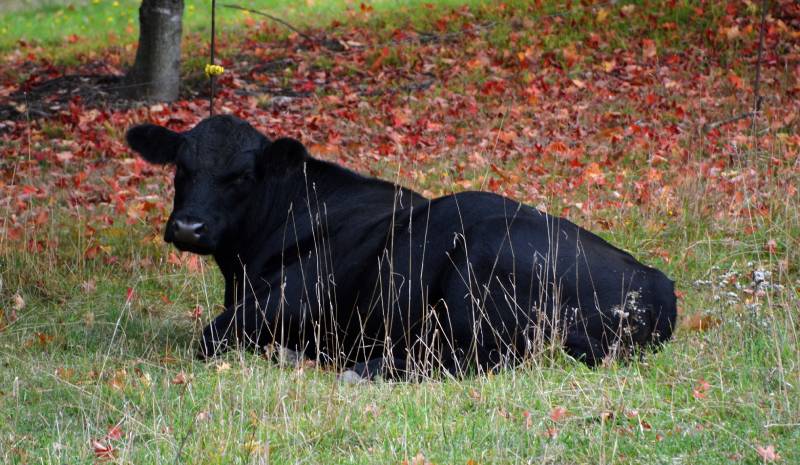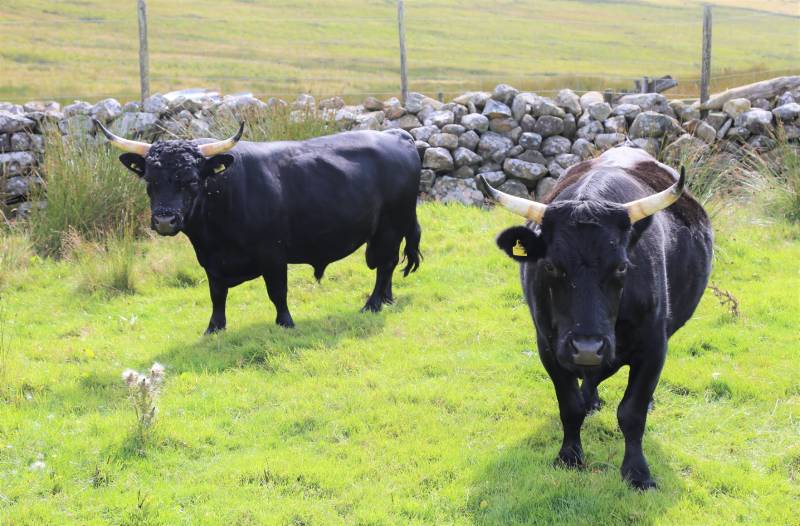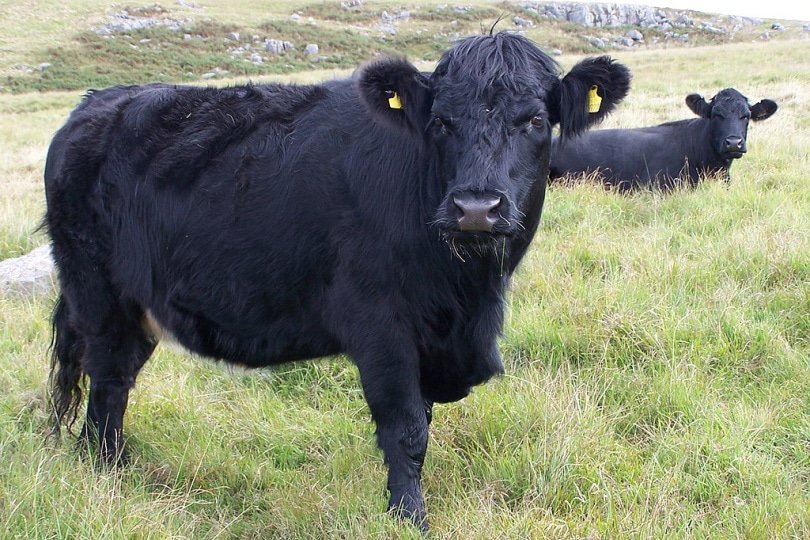The Welsh Black cattle breed is a native British breed that dates back to pre-Roman times. They originated in the rough hill country of Wales and have an excellent ability to utilize rough pasture while still producing award-winning meat.
Though Welsh Black cattle may be raised for meat or dairy, their primary use is for commercial meat production in inhospitable environments, especially for grass-fed or organic farming practices.

Quick Facts About Welsh Black Cattle
| Breed Name: | Welsh Black Cattle |
| Place of Origin: | Wales |
| Uses: | Meat, dairy |
| Bull (Male) Size: | 2,000 lbs |
| Cow (Female) Size: | 1,200 – 1,300 lbs |
| Color: | Black, red |
| Lifespan: | 10 – 20 years |
| Climate Tolerance: | Adaptable |
| Care Level: | Easy |
| Production: | High |
Welsh Black Cattle Origins
Welsh Black cattle are an ancient, pre-Roman breed that descended from the hardy hill cattle in Wales mountains. The original cattle came in two varieties: a stocky beef type from North Wales and a rangier dairy type from South Wales.
In 1883, a breed society was established, but North Wales and South Wales types had separate breed societies. In 1904, the two types were unified under the Welsh Black Cattle Society. The two types were interbred to produce a rugged beef breed.
The first Welsh Black cattle were brought to the US in 1963. Now, Welsh Black cattle associations are found in the US, Canada, Australia, and in other parts of the world. Currently, Welsh Black cattle are an endangered native breed in Wales.


Welsh Black Cattle Characteristics
Welsh Black cattle are horned and may be a variety of black shades, from rusty black to jet black, with some white on the underline. This is a hardy breed that produces high-quality meat and milk. The coat is thick and long—tightly curled hair is against breed standards.
These cattle generally have white horns with black tips, but there are also naturally hornless polled strains. It’s a highly adaptable breed that can forage and graze, making it ideal for heathland and moorland environments and for conservation grazing.
Uses
The Welsh Black cattle breed is ideally suited for commercial meat production, though it can be dual-purpose. It’s hardy and adaptable, offering benefits for modern farming systems.
This breed adapts well to a variety of situations, including lowland beef breeding and finishing. It can also thrive in marginal and upland areas. They’re among the fastest-growing British cattle breeds, both in rate of growth and weight. The thick winter coat and efficient digestive system produce maximum muscle with minimal fat, though the meat is marbled.

Appearance & Varieties
As the name suggests, most Welsh Black cattle are black, but a red recessive gene may appear in a black herd. The red cattle have no black genes, and a red bull and a red cow will produce a red calf.
Naturally polled Welsh Black cattle are available in both red and black with good breed standards.
Population/Distribution/Habitat
Welsh Black cattle are established in the UK, US, Canada, New Zealand, Australia, Germany, Spain, Saudi Arabia, Jamaica, and Uganda. They’re not bothered by cold or rain, due to their thick winter coats.
The harsh upland region of Wales, where these cattle come from, produced strong, attentive mothers and hardy calves.

Are Welsh Black Cattle Good for Small-Scale Farming?
With their ability to thrive in rough conditions, Welsh Black cattle are suitable for small- and large-scale commercial farming. Grass-fed and organic beef production operations benefit from the cattle’s foraging ability. Even with subpar conditions, this breed can produce excellent beef with rough pasture and upland grasses. They also grow quickly compared to other breeds and are generally docile animals.
The Welsh Black cattle breed is an ancient cattle breed that’s been refined over centuries for optimal meat production in rough environments. The combination of heredity and environment created a hardy, docile breed with tough mothers and calves, exceptional meat production, and the ability to utilize climates and pastures that would be otherwise unsuitable.
Featured Image Credit: Welsh Black Cattle Aberdare Blog (Darren Wyn Rees at Penderyn Online, via Wikimedia Commons, CC BY-SA 4.0)
